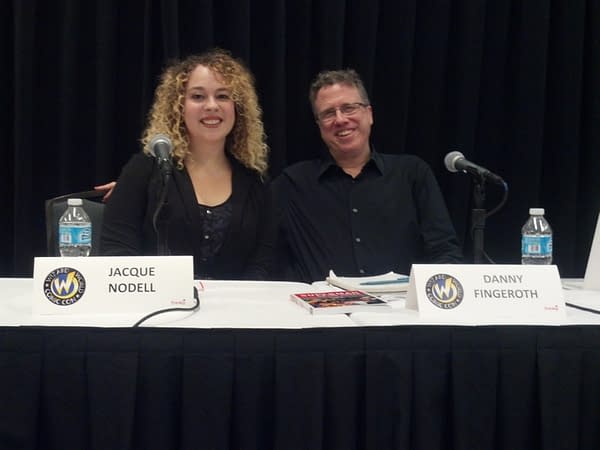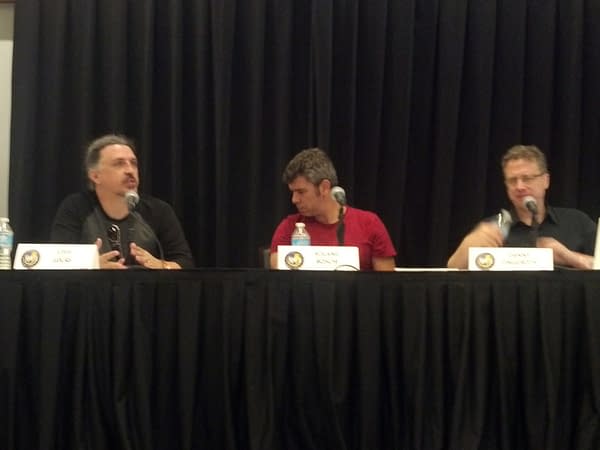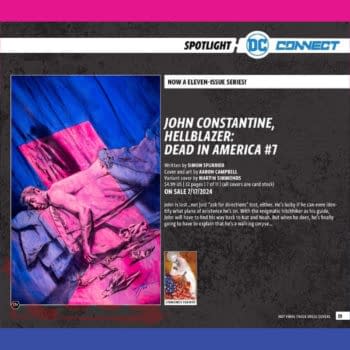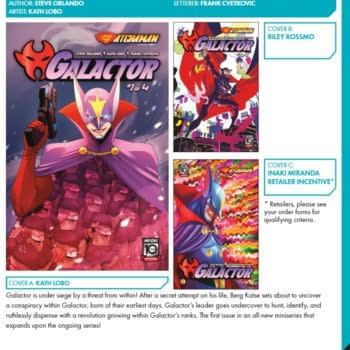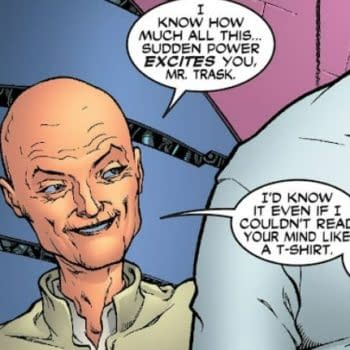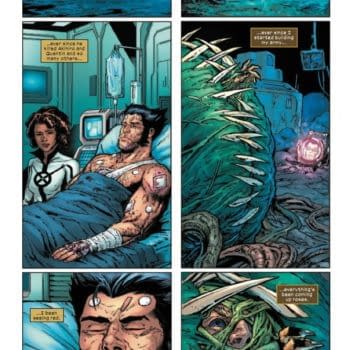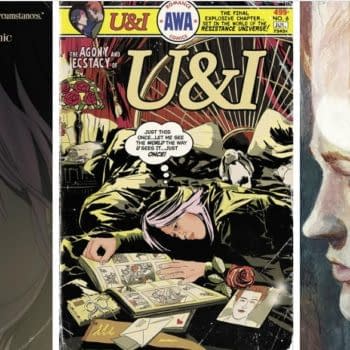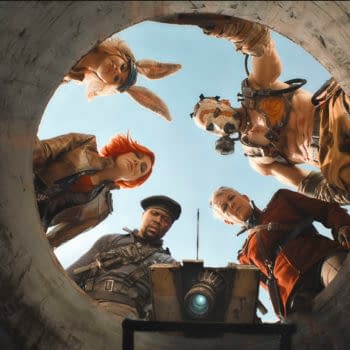Posted in: Comics, Recent Updates | Tagged: Comics, Danny Fingeroth, entertainment, green lantern, John Lucas, Marvel Comics, Roland Boschi, Wizard World Nasheville
What I Learned About Comics At The Wizard World Comic Con In Nasheville – From Love And The Green Lantern To Superstar Artists Insights
By Cat Taylor
Now that a few weeks have passed since the Wizard World Comic Con in Nashville, I have had a little time to digest the experience and pour over my notes from the panels of comics creators. I still regret missing Peter Bagge's panel on "How to Draw Funny" but as the first panel on the first day of the event, it was in an unfortunate place for my schedule. Fortunately, there were a few other interesting panels that I was able to attend. If you read my interview with Danny Fingeroth from a couple of weeks ago, you already know that he is Wizard World's "go to" moderator.
Fingeroth is ideally suited for this role as he has spent many years writing and editing comics. In addition, he has several published books on the subject and teaches courses on comic book history and appreciation at New York University and elsewhere. Needless to say, the results of having such a qualified panel moderator resulted in panels that were highly informative as well as entertaining.
First, among these panels was Love and the Green Lantern with panel guest, Jacque Nodell. Nodell is the granddaughter of Martin Nodell, creator of the original Green Lantern. She also runs a website that covers the history of romance comics, www.sequentialcrush.com, which was the main focus of her panel. One piece of new information that I learned from her appearance included that many well-known male writers used to write romance comics under female pseudonyms.
For instance, Steve Englehart wrote under the moniker, Ann Spencer. Nodell also pointed out that contrary to popular belief, the advice printed in the letters column to the young female readers was often sensible and empowering as opposed to being stereotypical patriarchal advice such as encouraging young females to find a husband as quickly as possible and forsake higher education. Similarly, the content within the older romance comics was typically much deeper than the common cover images of crying teenage girls would imply.
Although Nodell's panel was highly informative, I personally found the Superstar Artists' panel to be the most interesting one of the entire convention. This panel featured Deadpool's John Lucas and Wolverine's Roland Boschi. During this panel, both artists explained how their careers led to their current work for Marvel comics. Although both stories are far more detailed than could be explained here, one of the highlights of Lucas's career included the difficulty of getting past being typecast in certain roles in the comics industry.
For example, he mentioned that he started out as a penciller but wasn't allowed to ink his own work. At some point, he was made aware of a project that needed an inker, but the initial reaction to his interest in the project was being told, "but you're a penciller," to which he replied, "if it pays, then I'm an inker." Fortunately, he was allowed to take on the project and was eventually allowed to ink his own pencils since he finally had experience in both roles.
In Boschi's case, he broke into comics through animation. He described his 10-15 year tenure doing storyboards and character design for an animated series in France. Boschi explained that he eventually got his first job with Marvel by simply submitting sketches of his work. Lucas pointed out that Marvel almost never accepts submissions and remarked that Boschi was extremely lucky to even have anyone look at his unsolicited samples, telling any aspiring artists in attendance that simply submitting unsolicited sketches to Marvel will almost always fall on blind eyes. Lucas added that the best way to break into comics in the modern age is through digital comics simply because it's a medium anyone can use to self-publish and create an online portfolio. However, marketing one's digital work is an entirely separate skill. Despite his support for the medium as a way for new artists to begin, Lucas admitted to a certain disdain for the digital inking process, preferring to use old-school manual implements such as traditional brushes and pens.
Another matter that was discussed in this panel was the old "Marvel style" of comics writing, also known as "plot first", where a writer simply provides the plot and the artist has to actually flesh it out onto the printed page. Boschi said that he had done some work in this style but Lucas said that he had not. Furthermore, Lucas said that he would only work from a "plot only" script if he were given a "writer," or at least a "co-plotter", credit along with additional compensation. Of course, Lucas is an established artist with Marvel already and is in a better position to make such demands, whereas a new artist getting his or her first break with a company like Marvel or DC may not have the luxury of giving ultimatums. For anyone wanting to learn more about the different methods through which writers and artists work to bring a full published comic into existence, Fingeroth's book How To Create Comics may be of interest.
Although it seemed that there was a much greater focus on the movie and television celebrity panels, those of us who attended Comic Con mainly for "comics" were rewarded with a few well-structured and informative panels such as these. As a result, I highly recommend anyone who is a fan of comic books to make sure to catch some of these comics-focused panels when attending a Comic Con. At this point, there aren't that many to choose from. Perhaps if more convention attendees attend the ones that are offered, Wizard World will add more comics panels to future conventions.
Cat Taylor has been reading comics since the 1970s. Some of his favorite writers are Alan Moore, Neil Gaiman, Peter Bagge, and Kurt Busiek. Prior to writing about comics, Taylor performed in punk rock bands and on the outlaw professional wrestling circuit. During that time he also wrote for music and pro wrestling fanzines. In addition to writing about comics, Taylor tries to be funny by writing fast food fish sandwich reviews for Brophisticate.com. He's perplexed at how Aunt Bee on the Andy Griffith Show had so many suitors. He just doesn't see her appeal. You can e-mail him at cizattaylor@hotmail.com.


